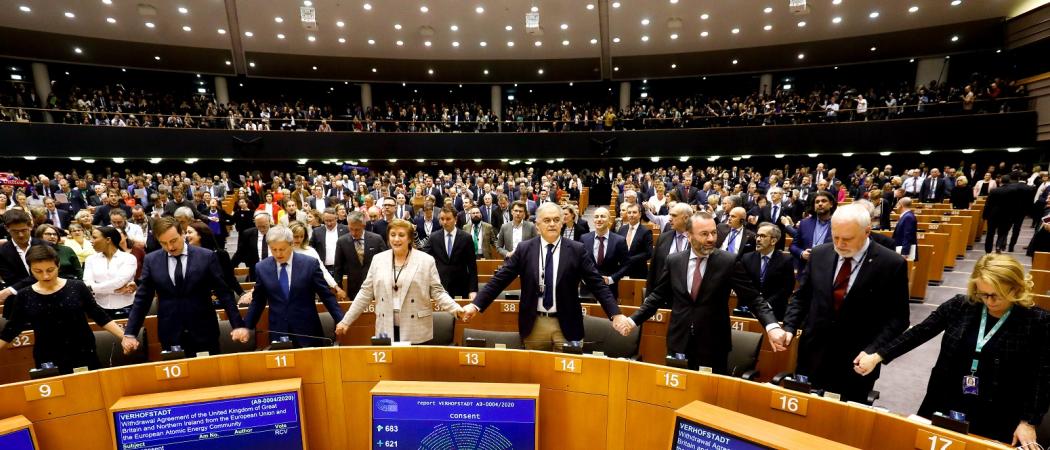On Brexit Eve, Science|Business asks scientists around Europe to share their thoughts and any advice they have for their UK counterparts as they set off on a new path

During the final vote on the Withdrawal Agreement of the United Kingdom, MEPs sang traditional farewell song "Auld Lang Syne". Photo: European Parliament
And so it is finally happening: tomorrow at midnight central European time, the EU bids farewell to the UK.
After a tortured three-and-a-half year plod to the exit, the country heads into an eleven month transition period where everything stands still, and then into the unknown of the yet-to-be negotiated Future Relationship.
In light of the historic moment, Science|Business contacted science figures around Europe, to find out:
How can the UK make the best of a situation many researchers desperately hoped to avoid? And how will Brexit remake UK science’s relationship with Europe?
Below are the responses.
Andre Geim, Nobel Prize winning physicist, regius professor and Royal Society research professor at Manchester University
 “There is no upside for science after Brexit. But it doesn’t need to be a disaster either.
“There is no upside for science after Brexit. But it doesn’t need to be a disaster either.
It all depends on how negotiations with the EU proceed. If the UK drops the populist mantra that dominated the last three years and instead adopts pragmatism, there is hope. The new government did show signs of pragmatism. They restored the student visa programme to the status preceding the changes introduced by ex-prime minister Theresa May, which severely harmed universities and economy.
Also, the government’s pragmatic attitude towards US-China economic wars should not be underestimated. If things continue this way, it should be possible for the UK to stay in the European Research Council (ERC) and Marie Curie frameworks, two of the most valuable EU programmes and important for UK universities.”
Otmar Wiestler, president, Helmholtz Association of German Research Centres
 “For the European science community, Brexit is a tragic development which will cause damage on both sides.
“For the European science community, Brexit is a tragic development which will cause damage on both sides.
Helmholtz researchers collaborate with many UK partners in a large number of EU projects. Transitory arrangements like those under (the ongoing) Horizon 2020 programme are critically important as they provide continuity to the researchers involved.
Science doesn’t stop at borders – and [Horizon 2020 successor] Horizon Europe will enable projects that wouldn’t be possible in bilateral settings. It is therefore in our vivid interest that the EU and UK find reliable solutions for Horizon Europe, with the UK as an ‘associated country’. Research and innovation are clearly highly relevant for both sides. This is why we sincerely hope that the Brexit negotiations will soon find a solution to maintain this successful relationship.”
Robert-Jan Smits, president, Eindhoven University of Technology, former director-general of research and innovation in the European Commission
 “The challenges which the UK will have to deal with are enormous.
“The challenges which the UK will have to deal with are enormous.
First of all, managing the aftermath of Brexit. In case the UK is not able to become fully associated to Horizon Europe, and as a result will no longer be able to participate in the prestigious ERC programme, it will need to develop new partnerships and programmes with partners from across the globe. It also will have to do a lot to attract foreign talent by offering excellent conditions and making it clear that the UK is still an attractive place to do research and that foreign scientists are welcome, even though the overall image of the UK is increasingly that ‘foreigners’ are not desired.
That Mark Walport [chief executive of UK Research and Innovation] will retire is not making things easy. Mark is a top scientist, manager and diplomat. He will be difficult to replace.
The good news is, however, that there is lots of money. The coffers are well filled. Even [Dominic] Cummings [Boris Johnson’s chief strategist, who was a key figure in the campaign for the UK to leave the EU] is a big fan of research, although he will certainly have some views about how programmes should be run.
It will also be a challenge for the UK science system to ‘keep politics out‘. The Johnson government will be much more hands on, very much to the dislike of the British science community.
I do hope, however, that the UK will become fully associated to Horizon Europe in the interests of both Britain and continental Europe. More than ever before, we need each other to address the grand societal challenges and ensure technological sovereignty.”
Detlef Gűnther, vice president for research and corporate relations, ETH Zurich
 “I’m extremely sad that they are leaving, that Brexit has really happened. Given the fact that science has been always global, I hope that we will find a way to maintain top researchers in our programme.”
“I’m extremely sad that they are leaving, that Brexit has really happened. Given the fact that science has been always global, I hope that we will find a way to maintain top researchers in our programme.”
From the Swiss experience, Gűnther also has some advice for the departing Brits. In February 2014, an immigration dispute between Bern and Brussels led the EU to cut off Swiss access to about two-thirds of the Horizon 2020 programme. In the two years it took for the dispute to be resolved, the Swiss government stepped in to fill the funding gaps – just as the British government has pledged to do; but the impact on the Swiss research was still severe, with a net loss in EU funding estimated by the Swiss government at CHF734 million (€686 million).
“The impact was traumatic,” recalled Gűnther. Though money was provided by the Swiss government, it was administered differently from EU grants, “which meant the funding schemes were really deviating from what had been done on the European level.”
His advice to the UK is that “the leaders should negotiate something” quickly. “Science should be decoupled from the rest” of the Brexit trade negotiations, “if you want to maintain the excellence” of research funding.
Jurriaan Ton, ERC Research Fellow, professor of plant environmental signalling, Sheffield University
 “I believe this country will need all its resources to address a stagnating post-Brexit economy and the increasing problems with health, infrastructure, and education. Despite the fact that fundamental research is key to societal and industrial innovation, it remains an inherently slow and risky process. So, I fear that cash investments in this type of research will be curtailed to address the more immediate impacts of Brexit.
“I believe this country will need all its resources to address a stagnating post-Brexit economy and the increasing problems with health, infrastructure, and education. Despite the fact that fundamental research is key to societal and industrial innovation, it remains an inherently slow and risky process. So, I fear that cash investments in this type of research will be curtailed to address the more immediate impacts of Brexit.
Sadly, the first signs of what will come are already there. Many of my European colleagues have left the UK to continue their world-leading research elsewhere, and we are already seeing a decline in the world-ranking positions of our universities. At the same time, many innovative biotech and agri-tech companies that are collaborating with UK research institutes are considering a departure from the UK, with the prospect of losing access to the EU single market.
All we can do at this stage is to keep this government accountable, and remind them of the long-term consequences of a hard Brexit. Recent statements suggesting 'Science is No10's priority post-Brexit' are simply not credible when at the same time they are putting our access to the largest and most diverse funding schemes in world [Horizon 2020 and Horizon Europe] at risk.”
Andreas Mortensen, vice president for research, Swiss Federal Institute of Technology Lausanne
 “After Brexit, the UK should be ready for several things when it comes to science. First, the country will have much less of a voice in defining future EU programmes. The uncertainty the country has lived under recently will not go away either. As a result, in addition to the discomfort and difficulty in planning for British scientists, the UK will experience a loss of credibility in building partnerships with European partners.”
“After Brexit, the UK should be ready for several things when it comes to science. First, the country will have much less of a voice in defining future EU programmes. The uncertainty the country has lived under recently will not go away either. As a result, in addition to the discomfort and difficulty in planning for British scientists, the UK will experience a loss of credibility in building partnerships with European partners.”
Mark Ferguson, director general, Science Foundation Ireland, chief scientific adviser to Irish government
 “Science and innovation are global endeavours, particularly when addressing important challenges such as health, climate change, sustainability and biodiversity. As the important negotiations begin between the UK and the EU to define future relations, let us hope that an appropriate mechanism can be found to continue and enhance important collaborations.”
“Science and innovation are global endeavours, particularly when addressing important challenges such as health, climate change, sustainability and biodiversity. As the important negotiations begin between the UK and the EU to define future relations, let us hope that an appropriate mechanism can be found to continue and enhance important collaborations.”
Jaak Aaviksoo, rector, Tallinn University of Technology
 “The UK is a very valuable component of European research. Better more than less collaboration with them [after Brexit].
“The UK is a very valuable component of European research. Better more than less collaboration with them [after Brexit].
“First they have to make up their minds in London, how they internally want to contribute [to future EU research programmes].” Aaviksoo supports the commission suggestion of pay-as-you-go for associated members [rather than the current system of paying a GDP-based sum into the central budget pot]. “I wouldn’t have any limitations [on which parts of the programme they can join]. If the financing issue is solved, then I think full participation [in the whole programme] is a better option.”
On future student mobility between UK and EU, Aaviksoo says, “I think they have to propose their views first. If they want to opt for very open possibilities for European student mobility, then I think we should reciprocate.” A more difficult issue, however, is how to handle fees of cross-border students, because UK universities normally charge for tuition and many on the continent do not - it isn’t clear yet how the two systems can be reconciled.
Mari Sundli Tveit, policy director, The Confederation of Norwegian Enterprise
 “The UK is one of Norway's most important partners in science as well as in trade. It's paramount that we keep our partnerships strong through the challenging times of negotiations to come. Strong scientific and business relations take time to build, and we fear that long lasting uncertainty regarding negotiation outcomes can weaken our relationships, setting us back for a longer time.
“The UK is one of Norway's most important partners in science as well as in trade. It's paramount that we keep our partnerships strong through the challenging times of negotiations to come. Strong scientific and business relations take time to build, and we fear that long lasting uncertainty regarding negotiation outcomes can weaken our relationships, setting us back for a longer time.
It's of great importance to the Norwegian scientific community that the UK still participates fully in future EU Framework programmes, and that its new relationship with the EU doesn't hamper the cooperation and scientific and student exchange between Norway and the UK. Norwegian businesses have been increasingly active in Horizon 2020, and future UK participation is equally important to them.
For Norwegian enterprises, the UK is one of our most important markets, depending heavily on the bilateral agreements to be negotiated in the time to come. We will contribute in any way we can to keep the bonds and business relationship with the UK as strong as possible in the future and hope to sign the necessary agreements without delay.”
Lee Cronin, ERC Research Fellow, regius chair of chemistry at Glasgow University
 “How to make the best of Brexit? Easy:
“How to make the best of Brexit? Easy:
- No immigration restrictions for highly skilled people.
- Double the science budget and focus on blue-sky research. Replace any loss of access to ERC with a similar system partnered with the ERC.
- Work out how we can participate in new EU collaborations.
- Build new national labs in the north and Wales to ‘level up’ rather than mess around with peer review.
- Use the national labs to help bridge the gap from blue sky to real innovations and economic value.”
Daniel David, pro rector for research, Babeș-Bolyai University
 “The EU should allow the UK to participate in Horizon Europe under the same conditions as member states. But research results should have the same legal status with regards to copyright and distribution.
“The EU should allow the UK to participate in Horizon Europe under the same conditions as member states. But research results should have the same legal status with regards to copyright and distribution.
By maintaining close ties with UK research, the EU would keep in the European research and education area a top competitive actor, making the area more dynamic.”
Thomas Fink, director, London Institute of Mathematical Sciences
 Fink sees potential for the UK to re-invent its research funding once outside of the EU.
Fink sees potential for the UK to re-invent its research funding once outside of the EU.
“Over the last three decades, the funding situation for basic sciences around the world has grown worse,” he says. “And Horizon 2020 is becoming less relevant. Why? The odds of success are getting lower and lower.”
“We live or die on the funds we raise. Whether it’s research councils here or funding from European programmes, the gap for actually getting the money is a year to 15 months. It needs to be quicker.”
Fink likes the idea of introducing a new research funding agency in the UK modelled on the US Defence Advanced Research Projects Agency, and the removal of research red tape that would follow. “Funding agencies now ask you for between 2-15 pages outlining the potential innovation to come out of your research project – that’s an extremely difficult task for researchers,” he said.
Jan Wöpking, managing director, German U15, association of research-intensive and medical universities
 “Let’s not mourn too long but focus instead on securing a research relationship between UK and Europe that is even stronger than before. It is imperative that we maintain the closest ties, both on a personal and on an institutional level.
“Let’s not mourn too long but focus instead on securing a research relationship between UK and Europe that is even stronger than before. It is imperative that we maintain the closest ties, both on a personal and on an institutional level.
And let’s fight together, on both sides, for a full association of UK to Horizon Europe. Let’s not get divided by political games but keep pushing for research to be a top priority in the upcoming negotiations.
And, most importantly, let’s continue to do fantastic research together. Because ultimately this is about the quality of research. And the stats are absolutely clear on this point: Collaborations between top researchers from UK and Germany deliver much stronger impact than research carried out in just one of our countries.”
Tiina Kupila-Rantala, vice managing director, CSC–IT Centre for Science, Finland
 “Of course we are hoping that there is no ‘Research Brexit’. Research should not be a victim of politics. Freedom of students to go from one university to another will suffer. That’s a pity. But I think we’ll find a way, sooner or later. It may not be smooth for a Finnish student to go to a British university, but it’s not impossible.”
“Of course we are hoping that there is no ‘Research Brexit’. Research should not be a victim of politics. Freedom of students to go from one university to another will suffer. That’s a pity. But I think we’ll find a way, sooner or later. It may not be smooth for a Finnish student to go to a British university, but it’s not impossible.”





 A unique international forum for public research organisations and companies to connect their external engagement with strategic interests around their R&D system.
A unique international forum for public research organisations and companies to connect their external engagement with strategic interests around their R&D system.